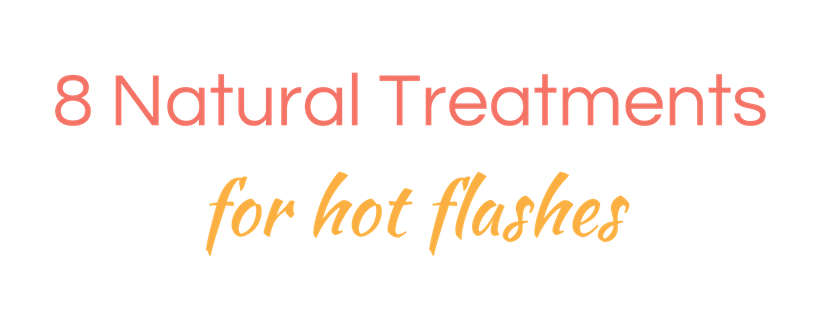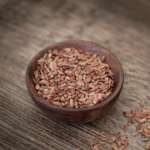
Looking for natural treatments for hot flashes? So are a lot of women around the world! Women going through the menopause transition often experience a lot of discomfort due to changes in their hormonal balance. One of the more common signs of menopause include hot flashes and night sweats – they can be very disconcerting. Many women are forced to seek medical advice on how to manage them, and depending on the intensity and frequency, natural treatments for hot flashes could be the answer you are looking for. Wondering what causes hot flashes? Read our previous article here.
The following are eight of the more effective natural treatments:
#1 Breathing Exercises

Studies have shown that women who do breathing exercises can significantly reduce the frequency and severity of their hot flashes.
In one study, significant reductions in hot flashes were observed in women who spent only a quarter of an hour every day doing breathing exercises. To use breathing exercises as a natural treatment for hot flashes, you first have to learn the correct way to do paced diaphragmatic breathing; you have to breathe in through your nose at a slow pace for about 5 seconds, then out through the mouth at the same pace. This exercise works by calming the sympathetic nervous system and improving blood circulation in the body. (1)
#2 Soy-based Foods
There is strong evidence that shows soy-based foods can prevent or reduce hot flashes. Soy contains phytoestrogens, which are natural compounds that can bind to the body’s estrogen receptors and essentially act like the hormone estrogen, thus preventing hot flashes. Soy-rich foods include tofu, miso, and soy milk, among many others. A study done in Japan indicated that women who ate soy had milder menopause symptoms, thanks to a phytoestrogen compound called daidzein, which is usually broken down by stomach bacteria to form S-eqoul, a substance that mimics estrogen. The bacteria that are needed to convert soy into S-eqoul reside in the large intestines, and many women are fortunate enough to have these bacteria in their system. Women who don’t have it in their bodies have the option of taking S-eqoul as a supplement. (2)
#3 Black Cohosh
A number of studies have shown that black cohosh can markedly reduce hot flashes, with one study claiming that it can work as well as estrogen and another one indicating that it can reduce hot flashes by about 84%. Black cohosh belongs to the same family as the buttercup, and it has been widely studied as a remedy for hot flashes. It works by mimicking estrogen in the body, affecting the serotonin receptors, and reducing the amount of luteinizing hormone, which is related to hot flashes. (3)
But – there has been a lot of controversy surrounding the use of black cohosh as a treatment for hot flashes, with many reports deeming it dangerous and harmful to menopausal women. (4) Some reports have associated the use of cohosh with liver damage. Other side effects such as nausea, diarrhea, low blood pressure, seizures, and slow heart rate have also been linked to the use of black cohosh in some recent reports.
Contrary to those reports, a clinical trial involving over 1200 subjects did not find any evidence that pure black cohosh caused liver damage. On the other hand, some commercial products that were labeled as black cohosh were found to have a variety of negative health effects, including liver damage. (5) One possible explanation for this discrepancy is that supplement makers tend to mix black cohosh with dangerous herbs accidentally when they source it in the wild, or maybe even intentionally to increase profit.
As a consumer, you may not be able to identify which brand of cohosh supplement is pure and which one is contaminated. If you want to use black cohosh as a treatment for hot flashes, it is advisable that you ask your doctor about it. When using any supplement that is surrounded by controversy, better to do your research and be satisfied about the manufacturer.
#4 Vitamin E Supplements
Vitamin E is an essential vitamin that plays an important role in the regulation of estrogen in the body. It is a natural antioxidant, and it can help reduce hot flashes thanks to its ability to improve the functioning of the arteries and to minimize inflammation in the body. A study conducted in Middle Eastern women indicated that vitamin E has the ability to reduce the frequency and the severity of hot flashes in menopausal women.
Experts recommend a daily dosage of 400 IU for optimal results. If you choose to take vitamin E supplement pills, you should always avoid exceeding the recommended daily limit, as excess vitamin E may have negative health effects.
#5 Flaxseed
 Flaxseed contains phytoestrogen compounds similar to those in soy. These compounds reduce hot flashes by imitating estrogen. (6) Research conducted by
Flaxseed contains phytoestrogen compounds similar to those in soy. These compounds reduce hot flashes by imitating estrogen. (6) Research conducted by
the Mayo Clinic indicated that women who add crushed flaxseed to their daily diet can reduce the frequency of their hot flashes by 50%, and the severity of the flashes can be slashed by up to 57%. Flaxseed has also been linked with mood improvement, reduction in night sweats, and reduction of muscle and joint pain. For the purposes of managing hot flashes, experts recommend that you add about 40 grams of flaxseed to your daily diet. Use your coffee grinder to crush the flaxseeds before eating them if you want the best results.
#6 Weight Loss and Exercise
Menopausal women who weigh more tend to have more frequent and severe hot flashes than their lighter counterparts. It’s a fact of biology that the more you weigh, the harder it is for your body to regulate heat, and menopause can exacerbate this problem. Losing some weight can help reduce hot flashes and night sweats in menopausal women. One study found that women who were put on a monitored nutrition and exercise regimen saw an improvement in their hot flashes after losing weight. (7)
#7 Mindfulness and Relaxation
Mindfulness practices such as yoga and meditation have been linked to lower blood pressure, better body temperature control, and better pain management. One study found that women who used mindfulness practices to manage their menopause were able to reduce the severity of their flashes by up to 40%. (8)
Muscle relaxation is thought to reduce hot flashes by lowering the secretion of hormones such as norepinephrine. These relaxation exercises involve the progressive tensing and relaxing of different muscle groups in the body, one after the other. Menopausal women can learn relaxation techniques from audiobooks, internet videos, or from classes offered by experts.
#8 Healthy Foods
Eating foods that contain plenty of healthy fats and important minerals can help with menopause symptom management by balancing the hormones in your body, and this can reduce the severity of hot flashes and other signs of menopause. Organic foods such as vegetables and fruits contain phytosterols which help with the balance of hormones. Vegetables such as kale, broccoli, and cabbage contain indole-3-carbinol, a natural chemical that aids estrogen balance in the body. Fiber-rich foods such as avocados, nuts, and legumes also contribute to the balance of estrogen. Palm oil, virgin coconut oil, and extra-virgin olive oil contain healthy fats that help with estrogen production. (9)
REFERENCES
- https://www.prevention.com/mind-body/natural-remedies/natural-menopause-solution-hot-flash-remedies/slide/2
- https://www.ncbi.nlm.nih.gov/pmc/articles/PMC2981010/
- http://www.menopause.org/for-women/menopauseflashes/menopause-symptoms-and-treatments/natural-remedies-for-hot-flashes
- https://www.consumerreports.org/vitamins-supplements/the-truth-about-black-cohosh-supplements-for-menopause/
- https://livertox.nih.gov/BlackCohosh.htm
- https://www.mayoclinic.org/diseases-conditions/menopause/diagnosis-treatment/drc-20353401
- https://www.ncbi.nlm.nih.gov/pmc/articles/PMC4270932/
- https://www.ncbi.nlm.nih.gov/pubmed/16932242
- https://draxe.com/5-natural-remedies-menopause-relief/




1 Comment
Pingback: In a Flash - Chapter 1 - Vergo Woman